By Dick Clement And Ian La Frenais, Part Two - Porridge 1973 - 1978.
The best naffing sitcom ever.
Which is funnier - gambling addicts or incarcerated criminals?
In 1973 the BBC screened a series of seven half-hour comedies, all featuring Ronnie Barker. One, written by Roy Clarke, became Open All Hours. Two were written by Dick Clement and Ian La Frenais.
The first was I'll Fly You For A Quid, a fairly standard sitcom about a family of obsessed gambling addicts in a small town in the Welsh Valleys. There are a few good lines, but it’s mainly notable for featuring a young Margaret John, best known as Doris from Gavin And Stacey.
The second was Prisoner And Escort, featuring Barker as Norman Stanley Fletcher, a recently sentenced criminal being taken from from London up to Slade Prison in windswept Cumberland, miles from anywhere.
The two writers, plus Barker, were offered the choice as to which one they would like to develop as a series.
“We discussed this with Ronnie over lunch at the rehearsal room canteen in Acton…It wasn't an easy choice, like deciding which one of your children you think shows more potential.” - Dick Clement.1
Porridge (1974 - 1976)
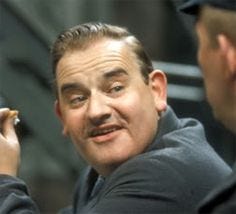
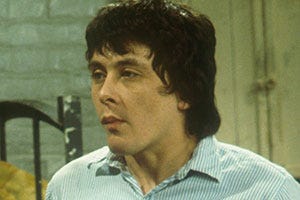

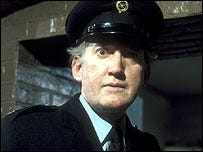
The four lead characters are all played to perfection. Clockwise from top left: (1) Norman Stanley Fletcher (Ronnie Barker), the old lag who wants to keep his nose clean and bide his time; (2) Lennie Godber (Richard Beckinsale), the naive young con on his first stretch; (3) Mr. Barraclough (Brian Wilde), the well-meaning warder who tries to help the prisoners; (4) Mr. Mackay (Fulton Mackay), tough no-nonsense Scottish head warder, engaged in a constant war of wills with Fletcher.
There may well be others I’m not aware of but for me the two major influences on Porridge are the US sitcom Sgt. Bilko (freely acknowledged by the writers) and the Ealing comedy Two-Way Stretch. The latter is possibly an unconscious influence, but the plot does involve prisoners escaping from jail then breaking back in again, which also happends in the Porridge movie (see a future post).

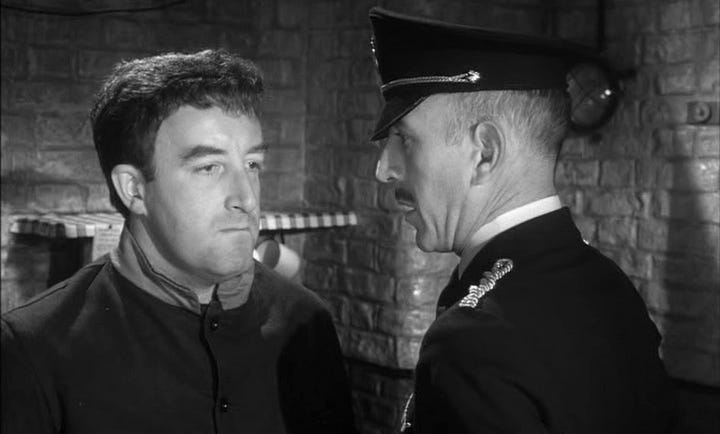
Porridge’s predecessors (L-R): Phil Silvers in Sgt. Bilko; Peter Sellers and Lionel Jeffries in Two-Way Stretch.
“Ronnie’s original conception was a character something like Sergeant Bilko, a crafty wheeler-dealer forever working the angles, in his case in the army.
We loved the show, but it wasn’t what we wanted to write. It seemed important to convey that prison is not a great place to be.”
Porridge is structured in a very similar fashion to Bilko. Just as Ronnie Barker is the star of Porridge, Phil Silvers is the star of Bilko.2 The Sarge interacts with the guys under his command in the motor pool, and he has scenes where his superiors are trying to keep his schemes in check, but we don’t often see Captain Hall giving orders to Doberman and Paparelli.
Similarly, in Porridge, Fletcher is the hub around which everything revolves, whether its being torn off a strip by Mr. Mackay, having a favour “requested” by the Mr. Big of Slade Prison, “Genial” Harry Grout, or dishing out advice to his fellow, less savvy inmates. Very few scenes of any length do not involve Fletch.
Some of the best episodes
These are my personal favourites, one from each of the three seasons, although to be fair you could make a case for every single episode.
1.4 A Night In
Four episodes in, a thirty-minute comedy/drama which had more in common with Play For Today than Terry And June.
Having spent three episodes establishing the strengths of the show - the interplay amongst the prisoners and also between prisoners and warders - Clement and La Frenais then took the interesting step of producing a whole episode with two actors only, in virtual darkness for a large part of the episode.
Fletcher realises Godber is having a hard time and raises his spirits. That’s literally the whole plot. And it worked spectacularly well, really driving home how grim the situation was for the leading characters. But it was still incredibly funny.
Fletch - We could go out, you know... yeah, I could phone up a couple of them dolly birds that dance on Top of the Pops. What are they called? Pan's People. There's one special one - beautiful Babs. Dunno what her name is.
2.4 No Peace For The Wicked
While most prisoners use Saturday afternoons to learn a trade or craft, or play football or ping-pong, Fletch just wants to be left alone to read his book, but is disturbed by interruption after interruption, until he finally snaps after a visit from the prison chaplain.
Mackay - Slade Prison, while it has known its share of violence, has never known a chaplain thrown over the balcony.
Fletch - I knew the safety net was there.
Governor - That’s hardly the point. The chaplain was shattered!Fletch - Oh, he'll bounce back, sir. Well…he did a bit, he just came up and…
Governor - Don't be insolent, Fletcher! I have no alternative but to sentence you to the maximum period of solitary confinement.
Fletch - Sir.
Governor - You’ve no-one but yourself to blame, you know. You have a very regrettable attitude, Fletcher. Perhaps you'll dwell on that over the next three days in isolation.
Fletch (looking horrified) - Three days, Sir?
Governor - Yes. Wheel him out.
Fletch - There’s just one thing, sir… you couldn’t make it a fortnight, could you?
3.4 Pardon Me
Blanco (David Jason), the oldest inmate in Slade Prison, was convicted long ago of murdering his wife and storing her body in a freezer. He has repeatedly protested his innocence, which means he has repeatedly been refused parole. After seventeen years he is finally granted parole (as Fletch points out “they need the beds, don’t they), but refuses since he is innocent, and accepting parole implies accepting guilt. Fletcher starts a campaign to have the old man pardoned, and the authorities eventually give in. The final payoff is perfect as Fletch and Godber bid goodbye to the old man for the last time:
Fletch - Listen. We all know you didn't kill your old lady.
Some other bloke did and you've paid for it.
But don't go out there harbouring any thoughts of revenge.
All right?Blanco - No I know him what did it. It were her lover. But don't worry. He died years ago.
Fletch - Well, that’s all right then.
Blanco - That I do know.It were me that killed him!
Going Straight
“Ah’m goin’ strai’, ah am, strai’ azzan arrer…”3
The six episode series following Fletcher after he is released from prison is, if anything more downbeat than Porridge. Fletcher is thoroughly institutionalised after half a lifetime behind bars.
He is determined not to weaken this time, but doesn’t find it that easy. In the nick, it’s all about keeping your nose clean and biding your time, but on the outside, you have to find employment, report to your parole officer, avoid your criminal mates, get used to looking after your family…
Ingrid (Fletch’s daughter) - I think you're going through your mid-life crisis.
Like what this article in Cosmopolitan said last week.
"The male menopause - cause and effect.”
Fletch - Listen, Ingrid, we will have none of that sort of talk in this house! You shock me at times, you do, you really do.
Ingrid - I'm not being rude, Dad, that's medical.
Fletch - Well, medical things ARE rude, ain't they?…
Fletch - I'll tell you what my mid-life crisis is, shall I? Shall I spell it out for you? I am a 45 year-old ex-lag, with no money, no prospects and as of now, no wife.
Now, for the sake of my family, I'm trying to go straight - which means at my age, with my qualifications, my future holds about as much excitement as a wet Sunday afternoon in Merthyr Tydfil.
Ingrid - Why Merthyr Tydfil?Fletch - I’ll tell you why. Because they got more pubs there than anywhere else in Britain - and they're all shut Sundays!
Fletch no longer has the status he had in the nick as a knowledgeable and smart old lag. He is no longer the one everyone goes to for advice or a favour, his missus has left him, and while his kids love him and look out for him, they’ve grown up OK without him. But he’s got enough sense to realise that he has to swallow his pride and start anew.
Going Straight tells a full story over its six episodes, as Fletcher gets a steady job as a night-porter at a doss-house hotel, but his desire to pay for his daughter Ingrid’s impending wedding to Lennie Godber tempts him to consider returning to his previous occupation.
I’ve always thought it was a shame it only lasted one series but it’s probably for the best as there wouldn’t be anywhere to go plot-wise without the show turning into The Fletchers - An Everyday Story Of Working-Class London.
Tell you what, though. If anyone could have made that premise work, it would have been Clement and La Frenais.
Other Articles You May Enjoy:
By Dick Clement And Ian La Frenais, Part One - Sitcoms 1963-1974
Excerpts From A Cluttered Mind #6 - Brooklyn Nine-Nine Edition
Fawlty Towers - The Greatest Sitcom Of Its Time?
Links:
Thank you. Come again.
From “More Than Likely”, the writers’ joint showbiz memoir, which is excellent on stories and name-dropping.
It’s actually called “The Phil Silvers Show” in the USA but Radio Times always billed it at Sgt. Bilko when it was re-run on BBC2 at 12:05 on a school night, usually, making it partially responsible for the poor O-Level results of the early seventies.
“I’m going straight I am, straight as an arrow, I’ve paid the price and done me time” - first line of the excellent theme tune, sung by Ronnie Barker and co-written by Dick Clement, after his partner Ian La Frenais had co-written the “Whatever Happened To The Likely Lads” theme. Clearly something of a Lennon-McCartney style friendly rivalry going on there.



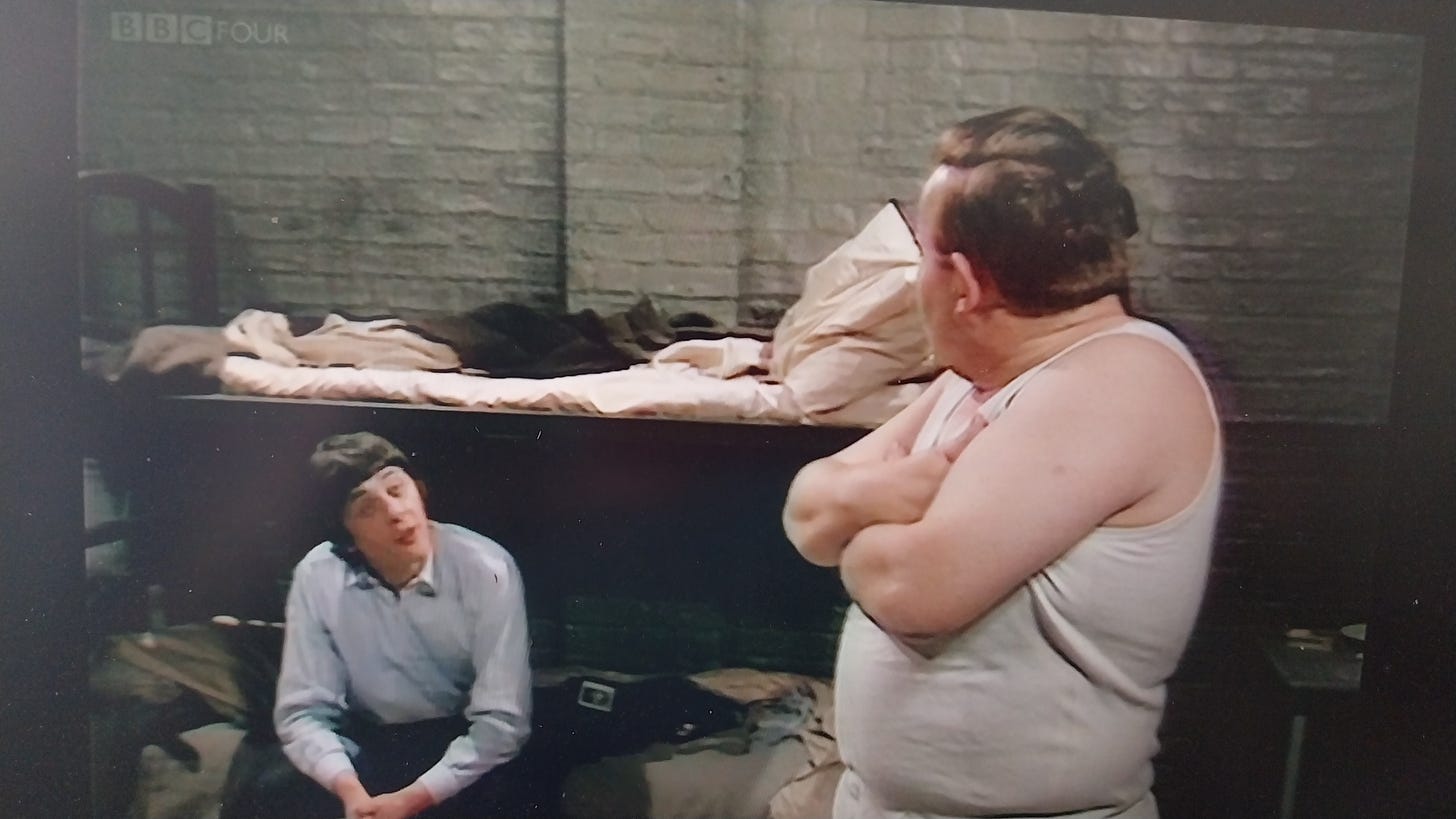
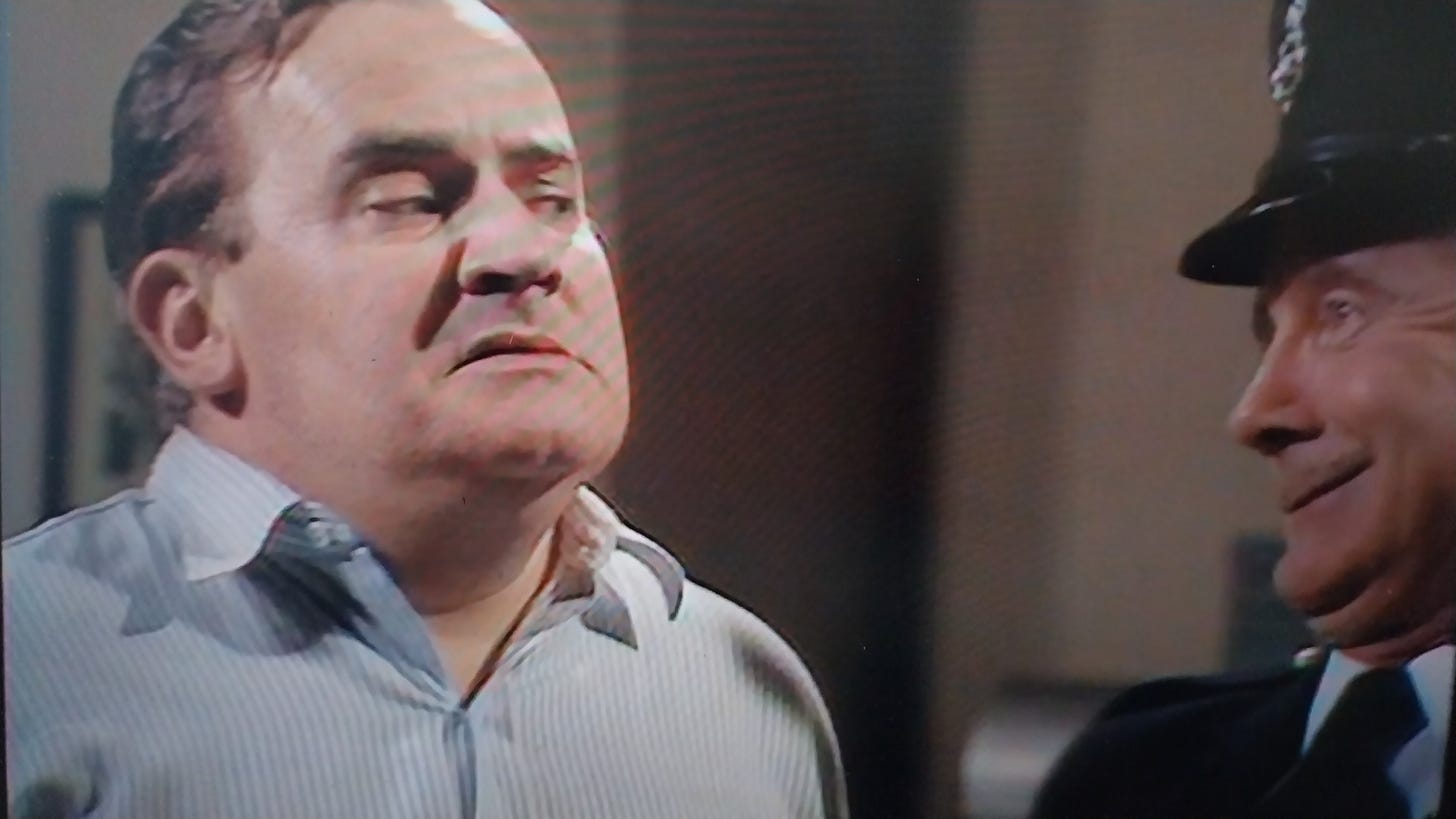
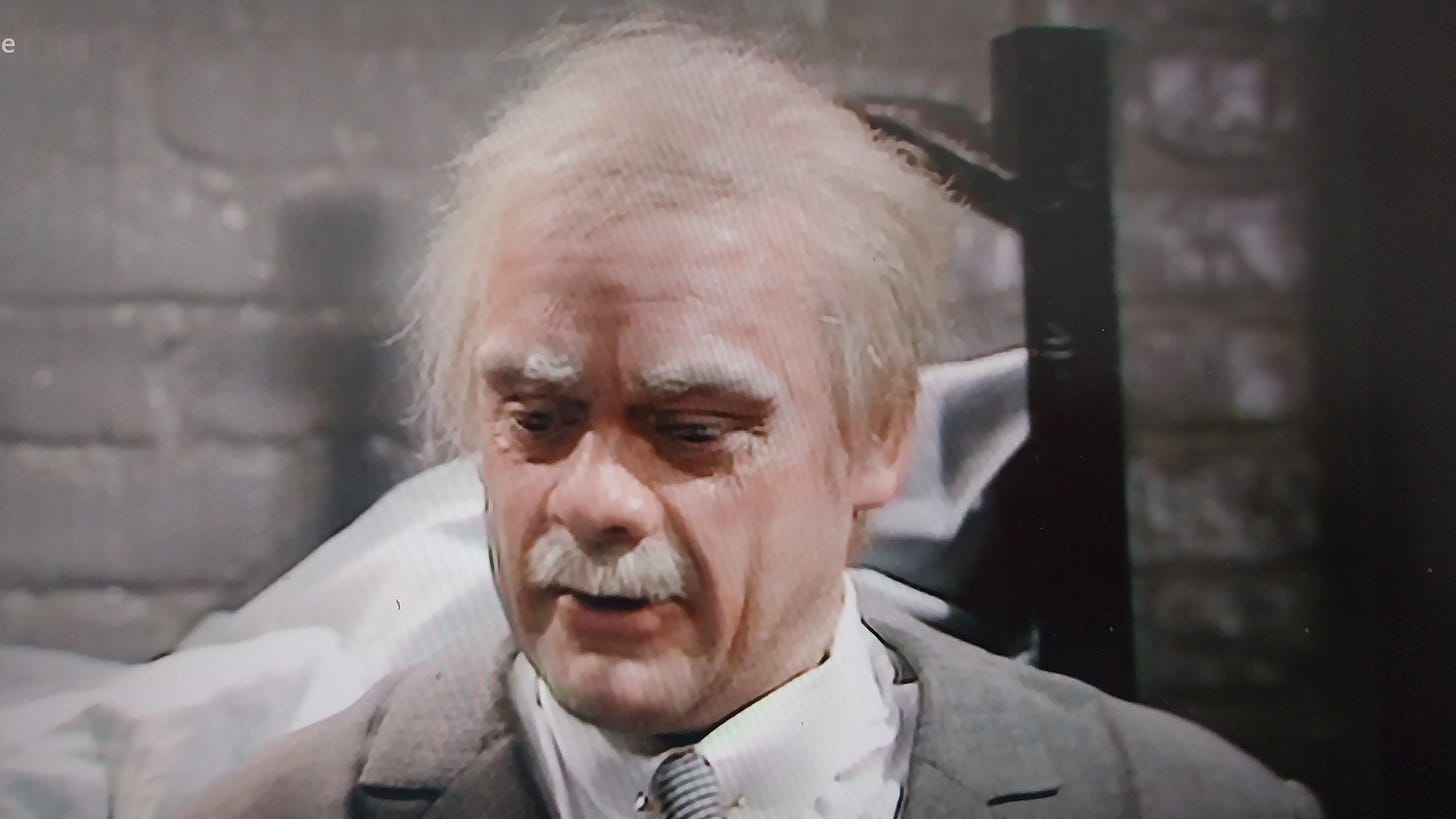
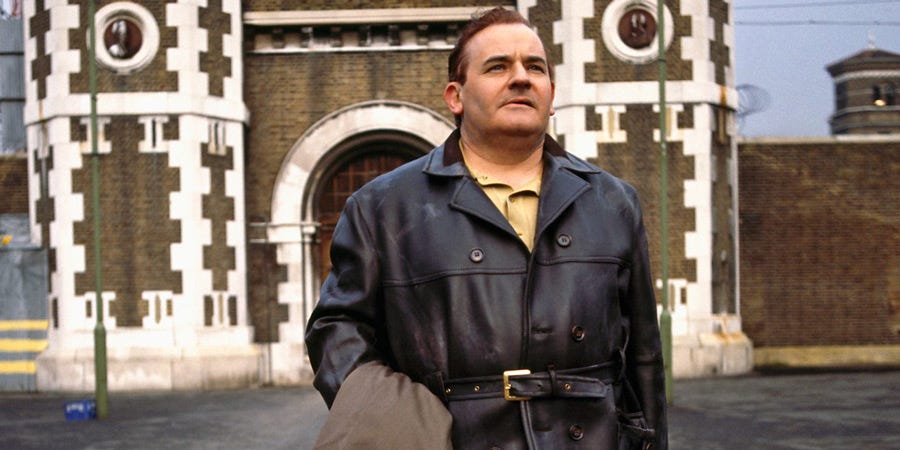
Fabulous review of a fabulous show, Tony, and you’ve captured the poignancy and the humour, for it was surely about both, of Norman Stanley Fletcher and Co’s plight perfectly.
Dick Clement and Ian La Frenais were, as you alluded to, but only in regards to their respective title song writing works, were the Lennon and McCartney of British comedy writers…and Alan Simpson and Ray Galton the Glimmer Twins…ha-ha?!
And Bilko…I absolutely loved that show. Why it was screened at that lunatic time heaven and the Beeb schedulers only know! I miss it now it’s no longer on…
Thanks for yet another delve into nostalgia that’s both worth the trip and a reminder of a life lived.
PS Not to be pedantic, but I think you’ve got your picture captions for Mr Mackay and Mr Barraclough in the wrong order.
I was able to watch Bilko at a reasonable time when I was ten. I have bought the entire collection on DVD as it is not convenient to stream. I am streaming Auf Weidersehn Pet, another work of genius from Clement and Le Frenais I always thought Bilko was a master class in TV comedy writing. The economy,the speed, the wit! I am sure it must have been an influence on the TV MASH.